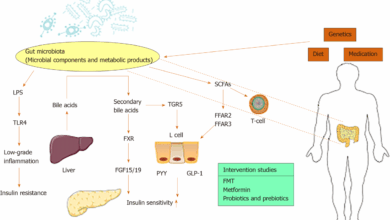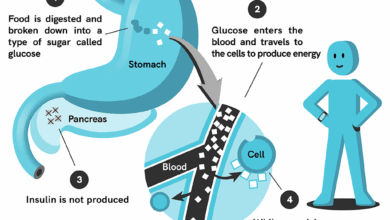
Eating to arm the immune system is about fueling your body with the nutrients it needs to fight off illness and stay healthy. We’ll explore the fundamental role of nutrition in immune function, delving into the specific nutrients vital for a strong immune response. From vitamins and minerals to the impact of different dietary patterns, this guide provides practical strategies to bolster your defenses through food.
We’ll examine the interplay between specific foods and their immune-boosting properties. Learn how certain nutrients, like vitamin C and zinc, directly support immune cell activity, and how to incorporate these power foods into your daily diet. We’ll also discuss how to build a balanced diet for optimal immunity, covering dietary patterns, portion control, and hydration. The focus will be on practical application, with easy-to-follow tips, sample meal plans, and delicious recipes to help you build a stronger, healthier you.
Defining Immune System Support Through Diet
Nourishing your body with the right foods is crucial for a robust immune system. A balanced diet, rich in specific nutrients, can significantly enhance your body’s natural defenses against illness and infection. This isn’t about quick fixes or miracle cures, but rather about consistently supporting your immune system’s fundamental functions through daily choices. A healthy diet acts as a cornerstone for a strong immune response.The intricate relationship between nutrition and immunity stems from the crucial role of nutrients in supporting the development and activity of various immune cells.
These cells, working in harmony, form the body’s defense network, protecting against a multitude of pathogens. The specific types of nutrients and their amounts play a critical role in ensuring the optimal function of these cells. Understanding this connection allows you to tailor your diet to enhance your immune system’s overall capacity.
Fundamental Role of Nutrition in Immune Function
The immune system relies heavily on a steady supply of essential nutrients to perform its functions effectively. These nutrients act as the building blocks and energy sources for immune cells, enabling them to recognize and eliminate pathogens. Adequate nutrition ensures the proper development and maturation of immune cells, contributing to their overall effectiveness. A deficiency in any critical nutrient can compromise the immune system’s ability to defend the body.
Different Types of Immune Cells and Dietary Impact
The immune system is composed of various specialized cells, each with a unique role in defense. B cells produce antibodies, crucial for neutralizing pathogens. T cells, another critical component, regulate immune responses and directly attack infected cells. Macrophages engulf and destroy foreign invaders, playing a vital role in the initial stages of immune response. These cells require specific nutrients for optimal function.
For instance, protein is essential for the production of antibodies and the structure of immune cells, while vitamins and minerals support their various functions. A balanced diet ensures sufficient supply of these vital nutrients, supporting the healthy function of all immune cells.
Nutrients Crucial for a Robust Immune System
A comprehensive approach to immune system support involves incorporating a wide array of nutrients into your diet. These nutrients are essential for the proper functioning of various immune cells and processes.
- Vitamins: Vitamins like vitamin C, vitamin D, and vitamin E are potent antioxidants, protecting cells from damage. Vitamin A plays a role in immune cell development and function. A balanced intake of these vitamins is critical for maintaining a strong immune system.
- Minerals: Minerals like zinc, iron, and selenium are essential for immune cell function. Zinc supports the production of antibodies, while iron is vital for oxygen transport, and selenium plays a crucial role in antioxidant defense. Adequate mineral intake is essential for optimal immune system health.
- Antioxidants: Antioxidants neutralize harmful free radicals, protecting cells from damage and supporting immune function. Many fruits and vegetables are rich sources of antioxidants, providing diverse benefits to the immune system. Incorporating a variety of colorful fruits and vegetables into your diet is key.
- Protein: Protein is the building block of immune cells and antibodies. Sufficient protein intake is essential for immune system function and repair.
- Healthy Fats: Essential fatty acids, like omega-3s, are crucial for cell membrane function and immune response regulation. These fats are important for overall health and immune system support.
Nutritional Content and Immune-Boosting Properties of Foods
The table below illustrates the nutritional content and potential immune-boosting properties of various foods. This is not an exhaustive list, but it provides a starting point for incorporating immune-supporting foods into your diet.
| Food | Nutrient Profile | Immune System Impact | Preparation Method |
|---|---|---|---|
| Citrus Fruits (e.g., oranges, lemons) | Vitamin C, antioxidants | Supports immune cell function, combats oxidative stress | Freshly squeezed juice, added to salads |
| Leafy Green Vegetables (e.g., spinach, kale) | Vitamins A, C, K, minerals | Provides essential nutrients for immune cell development and function | Sautéed, steamed, or added to smoothies |
| Fatty Fish (e.g., salmon, tuna) | Omega-3 fatty acids, vitamin D | Supports cell membrane function, enhances immune response | Baked, grilled, or pan-fried |
| Nuts and Seeds (e.g., almonds, pumpkin seeds) | Protein, healthy fats, vitamins, minerals | Provides essential nutrients for immune cell function and energy | Unsalted, as a snack or added to dishes |
| Yogurt (probiotic-rich) | Probiotics, protein | Supports gut health, potentially influencing immune response | Plain, with fruit or granola |
Specific Nutrients and Their Effects
Fueling your immune system goes beyond just taking a pill; it’s about understanding how specific nutrients contribute to a robust defense. This section delves into the crucial roles of vitamins, minerals, proteins, probiotics, and healthy fats in supporting immune function. We’ll explore how these nutrients work, what foods are excellent sources, and the consequences of deficiencies.The immune system’s effectiveness hinges on a complex interplay of nutrients.
Each plays a vital role in the production of immune cells, the regulation of inflammatory responses, and the overall health of the gut, a critical component of the immune system.
Vitamin C and Immune Function
Vitamin C, also known as ascorbic acid, is a potent antioxidant that plays a crucial role in immune cell function. It’s essential for collagen synthesis, which forms the framework of connective tissues, including blood vessels and supporting structures of organs. Vitamin C also enhances the activity of immune cells, particularly phagocytes, which are responsible for engulfing and destroying pathogens.Vitamin C aids in the production of antibodies, proteins that recognize and neutralize foreign invaders.
Its antioxidant properties protect cells from damage caused by free radicals, which can weaken the immune system.
- Excellent sources of vitamin C include citrus fruits (oranges, lemons, grapefruits), berries, bell peppers, and broccoli.
- Deficiencies in vitamin C can lead to impaired immune function, increased susceptibility to infections, and delayed wound healing.
Zinc and Immune Cell Activity
Zinc is a crucial mineral for numerous immune functions. It’s involved in the development and activity of various immune cells, including T cells and natural killer (NK) cells, which are vital for fighting infections. Zinc is also important for the production of antibodies and the proper functioning of the immune response.
- Good sources of zinc include red meat, poultry, seafood, beans, nuts, and whole grains.
- Zinc deficiency can impair immune cell function, making individuals more vulnerable to infections and hindering the healing process.
Protein and Immune Response
High-quality protein is essential for building and repairing tissues, including those involved in the immune response. Different types of protein impact immune function in various ways.
- Complete proteins, found in animal products like meat, poultry, fish, and eggs, provide all the essential amino acids needed for immune cell production. These amino acids are the building blocks of proteins.
- Incomplete proteins, found in plant-based sources like beans, lentils, and nuts, can contribute to overall protein intake but might need to be combined with other protein sources to ensure a complete amino acid profile.
- Protein deficiencies can lead to impaired immune function, as the body lacks the necessary building blocks to produce and maintain immune cells.
Probiotics and Gut Health
The gut plays a critical role in the immune system. Probiotics, live microorganisms, can positively influence gut health and immunity.
- Probiotics support the growth of beneficial bacteria in the gut, which helps maintain a balanced and healthy gut environment. This balance is crucial for immune function.
- Probiotic intake can reduce inflammation and enhance the production of antibodies, leading to a more robust immune response. This is especially important in cases of digestive issues.
- Fermented foods like yogurt, kefir, sauerkraut, and kimchi are excellent sources of probiotics. These foods are great options to add to your diet.
Omega-3 Fatty Acids and Inflammation
Omega-3 fatty acids, particularly EPA and DHA, are essential for reducing inflammation in the body. Chronic inflammation can weaken the immune system, making individuals more susceptible to infections.
- Omega-3 fatty acids help regulate the immune response by modulating inflammatory pathways. They are crucial for maintaining a healthy balance in the immune system.
- Fatty fish like salmon, tuna, and mackerel are rich sources of omega-3s. Plant-based sources like flaxseeds and chia seeds also contain omega-3s.
- A deficiency in omega-3 fatty acids can lead to an increased inflammatory response, negatively impacting immune function and potentially increasing the risk of various health issues.
Dietary Patterns for Optimal Immunity
Fueling your immune system with the right foods is crucial for overall well-being. A balanced diet rich in essential nutrients supports the intricate network of cells and processes that defend your body against illness. This approach goes beyond simply avoiding unhealthy foods; it involves understanding the diverse roles different food groups play in bolstering immune function. A nuanced approach to dietary patterns, taking into account individual needs and preferences, can significantly enhance your immune system’s ability to combat pathogens and maintain optimal health.A balanced diet is the cornerstone of a strong immune system.
Fueling your immune system through nutrition is crucial, especially now with the recent discovery of the cause behind the mysterious polio-like illness. Scientists have pinpointed the source, offering valuable insights into how our bodies react to unfamiliar threats. This research highlights the importance of a balanced diet to bolster your immune defenses and equip your body to fight off various illnesses.
Eating a variety of nutrient-rich foods is key to supporting your immune system’s ability to respond to these challenges, ensuring you’re ready to face any health hurdle, much like the fascinating discoveries in the cause of mysterious polio-like disease is discovered. cause of mysterious polio like disease is discovered This underscores the powerful connection between diet and overall well-being.
It provides the body with the vitamins, minerals, and antioxidants necessary for immune cell development, function, and repair. The varied nutrient profile of a balanced diet helps maintain optimal immune responses, preventing deficiencies that could compromise defense mechanisms. Consuming a broad range of whole foods, including fruits, vegetables, lean proteins, and whole grains, is paramount for supporting a healthy immune response.
Balanced Diet and its Relevance to Immune Health
A balanced diet is characterized by a variety of nutrient-rich foods from all food groups. This approach ensures the body receives a comprehensive array of vitamins, minerals, and antioxidants, which are vital for immune cell function. Vitamins like Vitamin C, Vitamin D, and Zinc are essential for immune response. Adequate intake of these nutrients, obtained through a balanced diet, promotes healthy immune cell development and activation.
Furthermore, a balanced diet helps maintain a healthy gut microbiome, which plays a critical role in immune regulation.
Comparing Dietary Approaches
Various dietary approaches, such as the Mediterranean and DASH diets, offer different yet complementary ways to support immune health. These approaches prioritize whole, unprocessed foods and emphasize nutrient density.
Mediterranean Diet
The Mediterranean diet emphasizes fruits, vegetables, whole grains, legumes, and healthy fats, primarily olive oil. This approach is rich in antioxidants and anti-inflammatory compounds, which contribute to a robust immune system. The inclusion of fish and seafood provides essential omega-3 fatty acids, known for their anti-inflammatory effects.
DASH Diet
The Dietary Approaches to Stop Hypertension (DASH) diet is designed to lower blood pressure. However, its emphasis on fruits, vegetables, whole grains, and low-fat dairy products makes it conducive to immune support. The focus on potassium-rich foods also contributes to overall health and immune function. The DASH diet’s emphasis on lean protein sources supports muscle repair and maintenance, which indirectly aids the immune system.
Sample Meal Plans
The following meal plans illustrate how to incorporate dietary patterns supporting immune health.
- Mediterranean Diet Sample Meal Plan: Breakfast: Oatmeal with berries and nuts. Lunch: Salad with grilled fish and olive oil dressing. Dinner: Lentil soup with whole-wheat bread and a side salad.
- DASH Diet Sample Meal Plan: Breakfast: Whole-wheat toast with avocado and a glass of milk. Lunch: Chicken salad sandwich on whole-wheat bread with a side of mixed greens. Dinner: Baked salmon with roasted vegetables and brown rice.
Pros and Cons of Dietary Patterns
| Dietary Pattern | Pros | Cons | Sample Meal Plan |
|---|---|---|---|
| Mediterranean Diet | Rich in antioxidants, healthy fats, and fiber. Supports heart health and inflammation control. | May be challenging to adhere to due to high emphasis on fresh, seasonal produce. | Breakfast: Greek yogurt with fruit and granola. Lunch: Salad with grilled chicken or fish, olives, and feta cheese. Dinner: Baked fish with roasted vegetables and quinoa. |
| DASH Diet | Excellent for managing blood pressure and promoting overall health. Lowers risk of chronic diseases. | May be perceived as restrictive for some, particularly regarding sodium intake. | Breakfast: Oatmeal with fruit and low-fat milk. Lunch: Turkey breast salad sandwich on whole-wheat bread. Dinner: Baked chicken breast with steamed broccoli and brown rice. |
Importance of Portion Control and Hydration
Portion control is essential for maintaining a healthy weight and preventing overconsumption of calories. Excessive calorie intake can negatively impact immune function. Hydration is equally important, as water plays a vital role in nutrient transport and waste removal, crucial for optimal immune system function. Adequate hydration supports the body’s ability to fight off infection.
Addressing Specific Needs and Considerations

Nourishing your immune system is a multifaceted process, extending beyond a simple list of nutrients. Individual needs and circumstances play a crucial role in optimizing immune function. Understanding how diet interacts with stress, illness, specific populations, and lifestyle factors is essential for achieving optimal well-being. This section delves into the nuanced ways in which dietary choices can support immune health in various situations.Dietary adjustments can significantly bolster immune response during times of stress or illness.
The body’s resources are often diverted to combating the immediate challenge, potentially compromising immune function. Prioritizing nutrient-rich foods becomes paramount during these periods. A diet rich in antioxidants, vitamins, and minerals, such as vitamin C, zinc, and vitamin D, can help support immune cells and their function. Adequate hydration is also critical for immune cell activity.
Dietary Support During Stress and Illness
A diet rich in fruits and vegetables, particularly those high in antioxidants, can help combat the oxidative stress often associated with illness and stress. Examples include berries, leafy greens, and citrus fruits. Including foods rich in protein, such as lean meats, poultry, fish, beans, and lentils, supports the production of immune cells. Proper hydration through water intake is also essential for immune function.
Dietary Support for Specific Populations
Specific dietary needs vary across different life stages and circumstances. For instance, children and pregnant women have unique nutritional requirements. A balanced diet that includes adequate amounts of essential nutrients, such as iron, folate, and calcium, is vital for supporting healthy growth and development. Moreover, the growing immune system of children and the developing fetus in pregnant women require sustained nourishment.
Dietary Support for Children
A child’s immune system is still developing, making them more susceptible to infections. A diet rich in vitamins and minerals is essential for immune development. Include a wide variety of fruits, vegetables, whole grains, and lean proteins in a child’s diet. Ensure adequate intake of vitamin D, iron, and zinc. Avoiding processed foods and sugary drinks is crucial for optimal immune function.
Regular consumption of fortified foods and supplements, when recommended by a healthcare professional, can support specific nutritional needs.
Dietary Support for Pregnant Women
Pregnancy places significant demands on the mother’s body. A balanced diet rich in essential nutrients is crucial for supporting both the mother’s and the developing fetus’s health. Adequate intake of folic acid, iron, and calcium is vital for the development of the fetus and the prevention of potential complications. A well-rounded diet with lean protein, whole grains, and healthy fats can also support the mother’s overall health and well-being during this time.
The Role of Sleep and Exercise in Immune Support
Sleep and exercise are inextricably linked to immune function. Adequate sleep allows the body to repair and restore, strengthening the immune system. Regular exercise also has a positive impact on immune function. A healthy lifestyle that includes sufficient sleep and regular physical activity complements the role of diet in supporting a strong immune response. Chronic stress and lack of sleep can negatively impact immune function.
Conversely, regular exercise can enhance immune function.
Food Sensitivities and Allergies
Food sensitivities and allergies can have a significant impact on immune health. A food sensitivity is a reaction to a food that doesn’t involve an immune response, but it can still cause symptoms like digestive issues or skin rashes. Food allergies, on the other hand, trigger an immune response, often resulting in more severe reactions.
Impact of Food Allergies on the Immune System
Food allergies occur when the immune system mistakenly identifies a harmless food protein as a threat. The immune system releases antibodies, such as immunoglobulin E (IgE), to attack the allergen. This response can trigger various symptoms, including hives, swelling, difficulty breathing, and anaphylaxis. The body’s response to these reactions can deplete the immune system’s resources and disrupt its overall function.
Fueling your immune system with the right foods is crucial, but sometimes health conditions like leukemia can impact overall well-being, even leading to complications like potential stroke risk. Learning more about the link between these conditions is important, for example, exploring whether leukemia can cause a stroke at can leukemia cause a stroke. Ultimately, a balanced diet remains key to supporting a robust immune response, which helps fight off potential health issues.
Impact of Food Additives and Preservatives
Food additives and preservatives are often added to processed foods to enhance their shelf life or taste. Some additives and preservatives can potentially impact immune function, potentially leading to chronic inflammation or other issues. However, more research is needed to determine the extent of their influence. Moderation in processed food consumption is important to mitigate any potential negative effects on immune function.
Practical Strategies and Tools for Implementation
Nourishing your immune system is not a daunting task; it’s about making conscious choices that support your body’s natural defenses. This involves integrating immune-boosting foods into your daily routine and utilizing practical tools to stay on track. By understanding the “how” and “what,” you can effectively build a stronger immune system through mindful dietary habits.Adopting a proactive approach to immune support requires a combination of smart food choices, strategic planning, and consistent effort.
This section will provide practical strategies and tools to make these changes manageable and sustainable, empowering you to nurture your immune system effectively.
Easy-to-Follow Tips for Incorporating Immune-Boosting Foods
Implementing immune-boosting foods into your daily meals doesn’t have to be complicated. Small, consistent changes can make a big difference. Prioritize whole, unprocessed foods. Aim for a rainbow of colors on your plate, representing a diverse range of vitamins and antioxidants. Include a variety of fruits, vegetables, lean proteins, and healthy fats in your diet.
Remember to listen to your body’s hunger cues and eat when you’re truly hungry.
- Start your day with a nutrient-rich breakfast. Oatmeal with berries and nuts, or a smoothie packed with leafy greens, fruits, and protein powder are excellent options. This kickstarts your metabolism and provides essential nutrients for the day.
- Incorporate colorful vegetables into every meal. Steam, sauté, or roast them to retain their nutrients. Aim for at least three servings of vegetables per day. Broccoli, spinach, carrots, and bell peppers are fantastic choices.
- Prioritize lean protein sources. Chicken breast, fish, beans, lentils, and tofu are excellent choices. They provide the building blocks for immune cells.
- Include healthy fats in your diet. Avocado, nuts, seeds, and olive oil are rich in healthy fats, crucial for hormone production and overall health.
- Hydrate consistently. Water is essential for many bodily functions, including immune system support. Carry a reusable water bottle and sip water throughout the day.
- Limit processed foods, sugary drinks, and excessive alcohol consumption. These can weaken the immune system and contribute to inflammation.
Resources for Planning and Tracking Diets
Numerous tools can help you plan and track your immune-supporting diet. Utilizing these resources can streamline your approach and help you stay on track.
Eating right is crucial for a robust immune system, but unfortunately, the world of health advice is often flooded with misinformation. This can be especially confusing when trying to figure out the best ways to fuel your body for optimal immune function. The proliferation of fake news plaguing the world of science, like fake news plaguing world of science , makes it harder to distinguish fact from fiction, so be sure to double-check your sources.
Ultimately, sticking to credible sources and focusing on a balanced diet remains the best approach to fortifying your immune system.
- Websites: Websites like the Mayo Clinic, Harvard Health Publishing, and the USDA provide valuable information on nutrition and immune function.
- Nutrition Apps: Many apps, like MyFitnessPal, Lose It!, and Cronometer, can help you track your calorie intake, macronutrients, and micronutrients. These apps can also provide personalized recommendations based on your specific needs.
- Meal Planning Services: Consider using meal planning services that specialize in creating immune-boosting meals. These services can provide personalized meal plans and recipes based on your dietary preferences and goals.
Sample Shopping List
This shopping list focuses on immune-supporting foods.
| Category | Items |
|---|---|
| Fruits | Berries, oranges, bananas, apples, grapes |
| Vegetables | Spinach, broccoli, carrots, bell peppers, onions, garlic |
| Proteins | Chicken breast, fish, beans, lentils, tofu, eggs |
| Healthy Fats | Avocado, nuts, seeds, olive oil |
| Grains | Quinoa, brown rice, oats |
Quick and Easy Recipes (Vegetarian)
These vegetarian recipes are designed to be quick and easy, while supporting immune function.
- Quick Chickpea Curry: Sauté onions, garlic, and ginger. Add chickpeas, diced tomatoes, and curry powder. Simmer until heated through. Serve over brown rice.
- Roasted Vegetable Medley: Toss chopped vegetables (broccoli, carrots, bell peppers) with olive oil, herbs, and spices. Roast until tender. A simple and nutritious side dish.
- Lentil Soup: Sauté onions, carrots, and celery. Add lentils, vegetable broth, and diced tomatoes. Simmer until lentils are tender.
Preparing Meals for Immune Support, Eating to arm the immune system
Preparing meals that support immune function is about prioritizing whole, unprocessed ingredients. Choose methods that preserve nutrients, like steaming, baking, or stir-frying. Minimize added sugars, unhealthy fats, and excessive sodium. Focus on flavor combinations that use fresh herbs and spices to enhance taste without compromising nutrition.
Illustrative Examples of Foods: Eating To Arm The Immune System

Fueling your immune system doesn’t have to feel like a chore. By strategically incorporating certain foods into your diet, you can provide your body with the essential nutrients it needs to thrive. Let’s explore some delicious and powerful examples that can support a healthy immune response.
Berries: Nature’s Antioxidant Powerhouses
Berries are packed with antioxidants, compounds that protect your cells from damage. These powerful little fruits boast a wide range of beneficial properties, making them an essential part of any immune-boosting diet. Their vibrant colors are a visual cue to the potent antioxidants within, which can help fight inflammation and oxidative stress, crucial factors in maintaining a strong immune system.
- Antioxidant-rich berries, such as blueberries, strawberries, raspberries, and blackberries, contain vitamins, minerals, and fiber that contribute to overall health. Their high concentration of antioxidants, specifically anthocyanins, contribute to their vibrant colors and potent immune-supporting properties.
- Anthocyanins, a type of flavonoid, have been shown to support immune function by reducing inflammation and promoting cell signaling. This antioxidant support helps protect against damage caused by free radicals.
- The potent antioxidant capacity of berries makes them an excellent addition to smoothies, yogurt, cereals, and even baked goods, offering a simple and delicious way to support your immune system.
Oysters: Zinc for a Robust Immune Response
Zinc is a crucial mineral for immune function, playing a role in cell growth, wound healing, and the production of antibodies. Oysters are a remarkably rich source of zinc. Incorporating them into your diet can provide a substantial boost to your immune system.
- Oysters are exceptionally high in zinc, a mineral vital for immune cell function. They are a fantastic dietary source, and a delicious one at that!
- Zinc is essential for the production and activation of immune cells, such as T cells, which are key players in fighting off infections. Zinc deficiency can compromise immune function.
- Regular consumption of zinc-rich foods, like oysters, can strengthen your immune response, helping your body combat illness more effectively.
Leafy Greens: A Bounty of Vitamins and Minerals
Leafy greens are a powerhouse of vitamins and minerals, offering a diverse array of nutrients essential for optimal immune function. They are not only visually appealing but also contribute significantly to overall health.
- Leafy greens like spinach, kale, and collard greens are rich in vitamins A, C, and K, as well as minerals like iron and folate. These nutrients are all critical components of a robust immune system.
- Vitamins A, C, and K are crucial for supporting immune cell function and promoting the production of antibodies. These nutrients contribute to the overall strength of the immune response.
- The high fiber content in leafy greens also aids digestion, which is closely linked to immune function. A healthy digestive system is an integral part of a strong immune system.
Nuts and Seeds: Essential Fats and Antioxidants
Nuts and seeds are a fantastic source of healthy fats, protein, and antioxidants. Their nutritional value makes them an essential part of a well-rounded immune-supporting diet.
- Almonds, walnuts, chia seeds, and flax seeds provide essential fatty acids, which are crucial for cell membrane function and overall immune system health.
- These foods are also rich in antioxidants, helping protect cells from damage and promoting a healthy immune response.
- Nuts and seeds can be enjoyed as snacks, added to salads, or incorporated into trail mixes. Their versatility makes them a simple and delicious addition to any diet.
Colorful Vegetables: A Spectrum of Immune Support
The vibrant colors of vegetables are a visual cue to the diverse array of vitamins, minerals, and antioxidants they contain. Their inclusion in your diet is essential for supporting a strong immune system.
- Colorful vegetables, such as carrots, bell peppers, and sweet potatoes, provide a wide range of vitamins, minerals, and antioxidants, which are all important for immune function.
- These nutrients help boost the immune system’s ability to fight off infections and promote overall health.
- Adding a variety of colorful vegetables to your meals can be a simple way to significantly enhance your immune system’s defenses.
Conclusive Thoughts
In conclusion, eating to arm your immune system is a powerful approach to overall health and well-being. By understanding the crucial role of nutrition in immune function, and implementing practical strategies to incorporate immune-boosting foods, you can significantly enhance your body’s natural defenses. This guide provides a comprehensive roadmap to nourish your body and build a resilient immune system. So, let’s eat our way to a stronger immune system!





